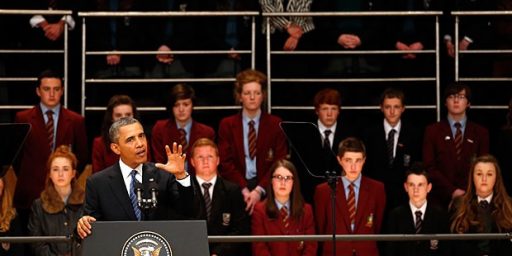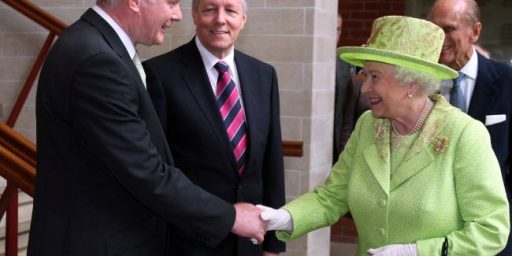Northern Ireland Starts Home Rule
Northern Ireland took control of its domestic affairs today, with the swearing in of Ian Paisley and Martin McGuiness.
Northern Ireland’s Protestant and Roman Catholic leaders, arch-foes during decades of sectarian conflict, were sworn in to run a new power-sharing, home-rule government on Tuesday. Hardline Protestant cleric Ian Paisley and Sinn Fein’s Martin McGuinness took the pledge of office as first minister and deputy respectively. They will lead the government in the British province that has been battling to cement political stability since a 1998 peace accord that largely ended 30 years of conflict that killed 3,600 people.
[…]
British Prime Minister Tony Blair and Irish Prime Minister Bertie Ahern, who have guided the Northern Ireland peace process for the past decade, will watch the swearing-in ceremony. Blair, who plans to stand down as prime minister soon, sees the latest power-sharing deal between the Protestant majority and Catholic minority as one of the main achievements of his 10 years in power after previous deals proved short-lived.
[…]
The Northern Ireland executive will have power over local affairs but London retains sovereignty over the province.
The main Protestant and Catholic groups, Paisley’s Democratic Unionist Party (DUP) and Sinn Fein, political ally of the Irish Republican Army (IRA) guerrilla group, reached agreement on March 26 to share power after years of deadlock.
[…]
It has been a strange role reversal for the 80-year-old Paisley who has been an outspoken defender of Northern Ireland’s British links and until recently refused to talk to Sinn Fein, which he viewed as indistinguishable from the IRA that waged a bloody 30-year campaign against British rule. McGuinness, a former member of the IRA, and Sinn Fein want to see the province united with the Irish Republic to the south.
Given that the Republic of Ireland was established as a sovereign state in 1921, with mostly-Protestant Northern Ireland remaining part of the UK, I have never had much sympathy for Sinn Fein’s cause. Still, a permanent end to what the Brits stoically call The Troubles would be welcome, indeed.






Small correction: Although Irish nationalists declared independence from the UK in 1921, the Irish Free State was not official until the Anglo-Irish Treaty of December, 1922.
You’d think that people would try to learn something from the single case of an apparently successfully resolved terrorist campaign in the last few ddecades.
A few lessons:
1) Ireland is right next to England. Ireland and England share a common language and a lot of common heritage. And yet the English tried for decades to crush the IRA without success.
2) The issue was eventually resolved not through military action but through negotiation.
Now if the English couldn’t crush an insurgency in their own backyead what are the odds we can do it half the world away when we don’t even speak the damn language?
Nil.
At the same time while we cannot negotiate with Al Qaeda there are plenty of Iraqi insurgency elements that we can negotiate with. And there are some things that AQ wants that we should be doing anyway, by doing those things we not only correct previous errors on our part but we also undercut AQ’s ability to recruit (by removing the issues they use to inflame the locals).
But military force will fail. And right now military force is the only thing we are trying.
The issue was eventually resolved not through military action but through negotiation.
Well, the Japanese surrender was ultimately achieved through negotiation. The dropping of two atomic bombs and the prospect of more following, however, may have been weighing on their minds during said negotiations.
The old saying that diplomacy without armaments is like music without instruments remains true.
The Japanese were compelled through military force to surrender. they had no chance of winning. They could have made the taking of Japan a really bloody affair but they would ultimately have lost. They knew it. Fat man And Little Boy drove home just how much they had to lose and how bloodthirsty the Allies were willing to be.
And Japan surrendered. Unconditionally.
On the other hand there is no indication that the IRA was losiong, much less that their situation was hopeless. And they did not surrender. Rather the Brits moved to a position of offering them some of what they wanted.
A compromise is not the same as a surrender.
No one is suggesting we disarm. Or at least I certainly am not. In fact I am all for actively waging psychological warfare on the various extremist islamic groups around the world. And at the same time keeping physical weapons ready for those uses where they are effective.
Sure. I’m not arguing that the situations are identical, merely that war is often a prerequisite for compromise in matters of national sovereignty. What was once unfathomable sometimes becomes palatable in the context of bloodshed.
When talking about International relationships I tend to agree that a credible threat of warfare, and sometimes actual warfare, is an important element.
But we aren’t talking about relations between states here. We are talking about relations between a state and a decidedly non-state actor.
Tlaloc:
English is the language of the colonizer. Gaeilge dates back way before the English invaded–its origins in Primitive Irish were spoken on the island as far back as 1200 BC.
English did not become prominent until the 19th century when the English banned the language from the schools and the An Gorta Mór decimated the population.
And discrimination based on by the Enlgish religion dates back to the 16th century.
There are significant cultural differences and a centuries-old history of English brutality and oppression.
Triumph,
the difference as minor by comparison. Yes I know they’ve had differences over the years. You can write series of books on the myriad nuanced differences between the english, the welsh, the Irish, and the scots.
None of which matters in the slightest compared to the differences between Americans and Iraqis.
That’s my point. Their differences are trivial in comparison. And yet the English couldn’t win.
And as far as language given that the entire IRA movement occured during the 20th century when the English language was well accepted on Irish Isle I’m just not seeing your point.
The differences between the english and the irish certainly exist but they are incredibly minor, particularly when compared to the differences between Americans and Iraqis.
And what the history of Irish languages from the 19th century and earlier has to do with a movement that was exclusively 20th century in nature I can’t really figure out.